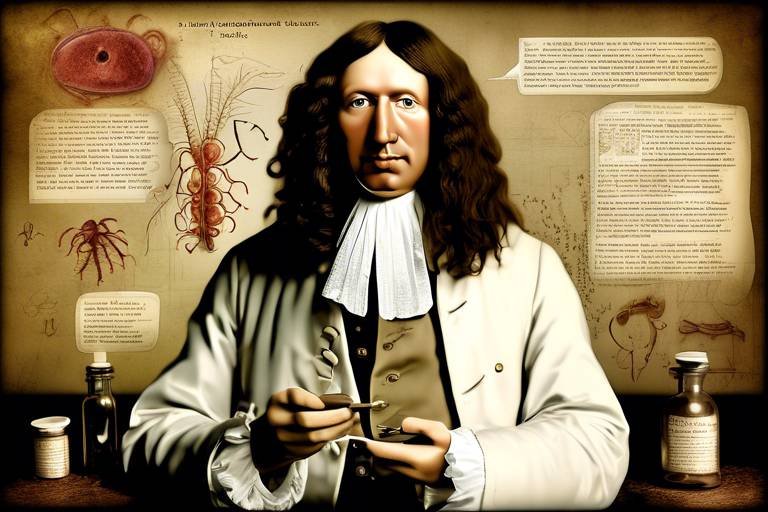The Contributions of Florence Nightingale to Modern Nursing
This article explores the pivotal role Florence Nightingale played in shaping modern nursing practices, highlighting her groundbreaking contributions to healthcare, sanitation, and nursing education that continue to influence the profession today. Nightingale, often referred to as the "Lady with the Lamp," not only revolutionized nursing but also set standards that resonate throughout the healthcare system. Her legacy is not merely historical; it is a living testament to the importance of compassion, education, and data in nursing.
Florence Nightingale's introduction of nursing as a respected profession marked a significant shift in healthcare. Before her influence, nursing was often seen as a last resort for women of lower social status. However, Nightingale's dedication to patient care transformed nursing from a disreputable occupation into a skilled vocation. She emphasized the need for trained nurses who could provide quality care, thereby elevating the profession to one of respect and integrity.
Nightingale's emphasis on hygiene and sanitation during the Crimean War drastically reduced mortality rates among soldiers. Before her intervention, hospitals were breeding grounds for infections, leading to unnecessary deaths. By advocating for proper sanitation practices, such as clean water, adequate ventilation, and proper waste disposal, she laid the foundation for modern infection control practices in hospitals worldwide. Her methods were revolutionary at the time and are still integral to healthcare today.
One of Nightingale's most remarkable contributions was her pioneering use of statistics to drive healthcare improvements. She understood that to advocate for change, one must present compelling evidence. Her innovative use of data visualization helped highlight the importance of sanitation and patient care in nursing. For instance, she meticulously recorded the causes of mortality and used these statistics to advocate for better conditions in military hospitals.
This groundbreaking graphic representation of mortality rates became a powerful tool for advocating health reforms. The Rose Diagram showcased Nightingale's ability to communicate complex data effectively to policymakers. It illustrated how poor sanitation directly correlated with high death rates, thereby compelling the British government to implement reforms in military healthcare.
Moreover, Nightingale's meticulous record-keeping established a standard for data collection in healthcare. Her approach to statistics not only influenced nursing practices but also shaped public health initiatives. By demonstrating the importance of accurate data, she paved the way for future generations of nurses and healthcare professionals to rely on evidence-based practices.
Florence Nightingale's commitment to nursing education led to the establishment of formal training programs. She recognized that a well-educated nurse could provide better patient care. Her influence helped create a structured curriculum that emphasized both theory and practical skills. Nightingale founded the Nightingale School of Nursing at St. Thomas' Hospital in London, which became a model for nursing schools worldwide.
The Nightingale Pledge, created in 1893, symbolizes the ethical standards of nursing. It emphasizes the moral responsibilities of nurses and remains a rite of passage for nursing graduates today. This pledge serves as a reminder of the commitment nurses make to their patients and the profession.
Nightingale's principles of compassion and integrity continue to guide nursing ethics, ensuring that patient care remains at the forefront of the profession. Her legacy is evident in the ongoing emphasis on ethical practices in nursing education and patient care.
Finally, Nightingale's model of nursing has inspired healthcare systems worldwide. Her emphasis on trained nurses has promoted the importance of quality care in improving public health and patient outcomes across diverse cultures. Today, the principles she established are echoed in nursing practices globally, proving that her influence transcends time and geography.
- What were Florence Nightingale's main contributions to nursing?
Nightingale's main contributions included the establishment of nursing as a respected profession, innovations in sanitation, the use of statistics for healthcare improvement, and the creation of formal nursing education programs.
- How did Nightingale influence sanitation practices?
Her emphasis on hygiene during the Crimean War led to significant reductions in mortality rates and laid the groundwork for modern infection control practices.
- What is the Nightingale Pledge?
The Nightingale Pledge is an ethical commitment made by nursing graduates, emphasizing their moral responsibilities towards patients and the nursing profession.
- Why is Nightingale considered the founder of modern nursing?
She is considered the founder due to her transformative contributions to nursing education, sanitation, and the establishment of nursing as a respected profession.

The Birth of Modern Nursing
Florence Nightingale's introduction of nursing as a respected profession marked a significant shift in healthcare. Before her time, nursing was often seen as a less-than-reputable occupation, filled with untrained individuals who lacked the necessary skills to provide adequate care. Nightingale, however, had a vision. She believed that nursing could be a noble profession, one that required both compassion and rigorous training. Her dedication to patient care transformed nursing from a disreputable occupation into a skilled vocation, paving the way for future generations of nurses.
Imagine a world where the sick and wounded were cared for by individuals who had no formal training, where cleanliness was an afterthought, and where patient care was often neglected. This was the reality before Nightingale stepped onto the scene. She saw the potential for nursing to evolve into a respected field, one that could save lives and improve healthcare outcomes. With her tireless efforts during the Crimean War, she not only demonstrated the importance of trained nurses but also highlighted the need for proper sanitation and hygiene in medical practices.
Nightingale's work during the war was revolutionary. She organized a group of nurses to care for the wounded soldiers, implementing strict hygiene protocols and advocating for better living conditions in hospitals. Her insistence on cleanliness and proper care led to a dramatic decrease in the mortality rates of soldiers. This success was not just a stroke of luck; it was the result of her meticulous attention to detail and her unwavering commitment to improving patient care.
To fully understand the impact of Nightingale's contributions, we can look at some key aspects that define the birth of modern nursing:
- Professionalization of Nursing: Nightingale's efforts helped elevate nursing to a respected profession, encouraging women to pursue careers in healthcare.
- Establishment of Training Programs: She founded the Nightingale Training School for Nurses in 1860, which became a model for nursing education worldwide.
- Focus on Hygiene: Nightingale's emphasis on sanitation practices laid the groundwork for modern infection control protocols in hospitals.
Furthermore, Nightingale's commitment to education was groundbreaking. She believed that nurses should be well-educated, not only in practical skills but also in the theories behind patient care. This holistic approach to nursing education ensured that future nurses would be equipped to handle the complexities of patient care, making them invaluable assets to the healthcare system.
In essence, Florence Nightingale transformed nursing into a profession characterized by compassion, skill, and integrity. Her legacy continues to influence nursing practices today, reminding us that the heart of nursing lies in the unwavering commitment to patient care and the relentless pursuit of knowledge. The birth of modern nursing, ignited by Nightingale's passion and vision, has forever changed the landscape of healthcare, ensuring that nurses are recognized as essential members of the medical community.

Innovations in Sanitation
Florence Nightingale's impact on sanitation during the Crimean War was nothing short of revolutionary. Imagine a battlefield hospital where the conditions were so dire that soldiers were more likely to die from infections than their injuries. Nightingale stepped into this chaos, armed with her unwavering belief in the power of cleanliness and proper hygiene. She understood that a clean environment could be the difference between life and death, and she was determined to prove it. Her systematic approach to sanitation not only saved countless lives but also laid the groundwork for modern healthcare practices.
One of the most significant changes Nightingale implemented was the introduction of basic hygiene practices. She mandated regular cleaning of the wards, proper disposal of waste, and adequate ventilation. These practices may seem commonplace today, but at the time, they were revolutionary. Nightingale's insistence on cleanliness helped to reduce the hospital's death rate from a staggering 42% to just 2% in a matter of months. This dramatic decrease was a clear testament to the importance of sanitation in healthcare.
Moreover, Nightingale didn't just stop at the hospitals; she advocated for improved sanitation in the broader community. She believed that the health of soldiers was intrinsically linked to the health of the environment around them. By pushing for better sanitation practices in military camps and surrounding areas, she aimed to create a holistic approach to health that encompassed both individual and communal well-being. Her efforts led to significant improvements in the living conditions of soldiers, which, in turn, contributed to better health outcomes.
In her quest for improved sanitation, Nightingale also recognized the importance of data. She meticulously collected and analyzed statistics related to sanitation and health outcomes. This data-driven approach allowed her to highlight the correlation between hygiene practices and mortality rates. It was through her innovative use of statistics that she could effectively communicate her findings to military officials and policymakers, ultimately influencing healthcare reforms. Her ability to present complex data in an understandable way was groundbreaking and remains a crucial aspect of healthcare advocacy today.
To illustrate the effectiveness of her sanitation initiatives, Nightingale developed various tools, including the famous Rose Diagram. This diagram visually represented the impact of sanitation on mortality rates, making it easier for decision-makers to grasp the urgent need for reform. Nightingale’s use of such visual aids marked a significant advancement in how health data could be presented and understood, paving the way for future public health campaigns.
In summary, Florence Nightingale's innovations in sanitation were not merely about cleaning; they were about transforming the entire healthcare landscape. Her emphasis on hygiene, data-driven decision-making, and community health advocacy has left an indelible mark on nursing and public health. Today, her legacy lives on in the rigorous sanitation standards we uphold in healthcare facilities worldwide, reminding us that sometimes, the simplest solutions can have the most profound impacts.
- What were the main sanitation practices introduced by Florence Nightingale?
Nightingale emphasized regular cleaning, waste disposal, and ventilation in hospitals, which significantly reduced infection rates.
- How did Nightingale use data to improve sanitation?
She collected and analyzed statistics to demonstrate the relationship between hygiene practices and patient outcomes, influencing healthcare reforms.
- What is the Rose Diagram?
The Rose Diagram is a visual representation created by Nightingale to showcase the impact of sanitation on mortality rates, aiding in her advocacy for health reforms.
- How did Nightingale's sanitation innovations influence modern healthcare?
Her practices established foundational standards for hygiene in healthcare settings, which are still in place today to ensure patient safety.

Data-Driven Decision Making
Florence Nightingale was not just a nurse; she was a visionary who understood the power of data in transforming healthcare. During the Crimean War, she meticulously collected data on soldier mortality rates and the conditions they faced. This wasn't just a numbers game for her; it was about saving lives. Imagine walking into a hospital where the air is thick with the stench of decay, and the sick are left to suffer without proper care. Nightingale saw this and knew that something had to change. She used her findings to advocate for better hygiene and sanitation practices, proving that data could be the key to revolutionizing patient care.
One of her most significant contributions was her innovative use of data visualization. She didn't just present numbers; she created compelling graphics that made the data accessible and understandable. For instance, her famous Rose Diagram effectively illustrated the stark mortality rates among soldiers. This visual tool was not merely an artistic endeavor; it was a strategic weapon in her campaign for reform. By presenting complex data in a clear and engaging way, she was able to persuade policymakers and military leaders to take action, demonstrating that numbers could tell a story that would resonate deeply with those in power.
Moreover, Nightingale's emphasis on statistical records set a new standard in healthcare. She believed that accurate data collection was essential for identifying problems and implementing solutions. This meticulous attention to detail laid the groundwork for modern healthcare practices and has influenced countless nursing protocols and public health initiatives. Today, we see her legacy in the way nurses and healthcare professionals rely on data to make informed decisions, ensuring that patient care is always based on the best available evidence.
In essence, Nightingale's approach to data-driven decision-making has not only shaped nursing but has also had a profound impact on the broader healthcare landscape. Her belief that data could lead to actionable insights has paved the way for evidence-based practices in medicine. With this foundation, healthcare professionals can now utilize data analytics to enhance patient outcomes, streamline operations, and improve overall public health. This is the enduring legacy of Florence Nightingale: a commitment to using data as a tool for change and improvement in the field of nursing.
- What is the significance of Florence Nightingale's data collection methods?
Nightingale's data collection methods revolutionized nursing by emphasizing the importance of evidence-based practices in healthcare. Her approach laid the groundwork for modern statistics in medicine. - How did Florence Nightingale use data visualization?
She used data visualization techniques, such as the Rose Diagram, to effectively communicate complex data to policymakers, making a compelling case for healthcare reforms. - What impact did Nightingale's work have on nursing education?
Nightingale's commitment to data-driven practices influenced nursing education by promoting the need for structured training programs that emphasized both theoretical knowledge and practical skills.

The Rose Diagram
Imagine a world where numbers and data tell a story so compelling that it sparks change. This is precisely what Florence Nightingale achieved with her innovative creation, the Rose Diagram. Developed during the Crimean War, this groundbreaking graphic representation of mortality rates was not just a simple chart; it was a powerful tool that communicated the urgency of reform in healthcare. Nightingale understood that to advocate for improved sanitary conditions, she needed to present her findings in a way that was visually engaging and easily understandable to those in power.
The Rose Diagram depicted mortality rates among soldiers in a visually striking way, using a circular format that resembled a rose. Each segment of the diagram represented a different month, and the length of each segment corresponded to the number of deaths. This allowed viewers to quickly grasp the severity of the situation. By transforming raw data into a visual format, Nightingale was able to highlight the stark contrast between the mortality rates before and after sanitation improvements were implemented. It was a prime example of how effective communication can lead to significant change.
Furthermore, Nightingale's Rose Diagram showcased her pioneering spirit in the realm of data visualization. At a time when statistics were often relegated to dusty books, she brought them to life, making them accessible and actionable. This approach not only influenced healthcare practices during her time but also laid the groundwork for future data-driven decision-making in nursing and public health.
To appreciate the impact of the Rose Diagram, it's essential to recognize its role in shaping public perception and policy. The diagram served as a visual argument for the need for sanitary reforms in military hospitals, ultimately leading to the establishment of better hygiene practices that saved countless lives. Nightingale's ability to convey complex information through a simple yet powerful graphic is a testament to her genius.
In today's world, the principles behind the Rose Diagram continue to resonate. Data visualization remains a critical component in various fields, including healthcare, where it helps professionals make informed decisions based on patient data. Nightingale's legacy lives on, reminding us that the way we present information can significantly influence outcomes.
- What is the significance of the Rose Diagram?
The Rose Diagram was significant because it visually represented mortality rates, making the data more accessible and compelling, which helped advocate for necessary healthcare reforms. - How did Florence Nightingale use the Rose Diagram?
Nightingale used the Rose Diagram to illustrate the impact of sanitation on mortality rates during the Crimean War, effectively communicating the need for improved hygiene practices. - What impact did the Rose Diagram have on healthcare?
The Rose Diagram played a crucial role in highlighting the importance of sanitation, leading to better healthcare policies and practices that saved lives.

Statistical Records
Florence Nightingale was not just a caregiver; she was a visionary who understood the profound impact of data in the healthcare arena. Her meticulous approach to record-keeping set a new standard that transformed nursing and public health practices. Imagine a world where decisions about patient care were made based on intuition alone—chaotic, right? Nightingale changed that narrative by championing the use of statistics to inform healthcare decisions.
During her time in the Crimean War, she collected and analyzed data on soldier mortality rates, which was revolutionary for that era. She didn’t just keep records for the sake of it; she used her findings to advocate for significant changes in hospital conditions. Her work revealed that poor sanitation was a leading cause of death, and this data was instrumental in prompting reforms that saved countless lives.
Nightingale's statistical records were groundbreaking because they were not only detailed but also visually compelling. She created a variety of charts and diagrams, including the famous Rose Diagram, which illustrated the causes of mortality in a way that was easy for policymakers to understand. This ability to communicate complex information through visuals was a game-changer and is a practice that remains vital in nursing today.
Her commitment to data collection didn't stop at the battlefield. Nightingale established the first-ever nursing school, the Nightingale School of Nursing at St. Thomas' Hospital in London, where she instilled the importance of statistical education in her curriculum. This emphasis on evidence-based practice laid the groundwork for modern nursing education, ensuring that future nurses would be equipped with the skills to collect and analyze data effectively.
To further appreciate Nightingale's impact, consider this table that outlines her contributions to statistical records:
| Contribution | Description | Impact |
|---|---|---|
| Data Collection | Systematic recording of patient outcomes and conditions. | Established a standard for future healthcare data collection. |
| Data Visualization | Creation of charts, including the Rose Diagram. | Enhanced understanding of health issues among policymakers. |
| Nursing Education | Incorporation of statistics into nursing training. | Prepared nurses to use data in clinical decision-making. |
In essence, Nightingale’s legacy in statistical records is not just about numbers; it’s about the lives those numbers represent. Her pioneering work has influenced countless healthcare professionals to adopt a data-driven approach, ensuring that patient care is both effective and compassionate. Today, the principles she established continue to resonate, reminding us that behind every statistic, there is a human story waiting to be told.
- What was Florence Nightingale's main contribution to nursing?
Florence Nightingale revolutionized nursing by establishing it as a respected profession and emphasizing the importance of hygiene, sanitation, and education in healthcare. - How did Nightingale use statistics in her work?
Nightingale collected and analyzed data on patient outcomes, using visual representations to advocate for healthcare reforms and improve hospital conditions. - What is the Nightingale Pledge?
The Nightingale Pledge is an ethical code of conduct for nurses, created in 1893, that emphasizes the moral responsibilities of nurses towards their patients. - Why is Nightingale's legacy important today?
Her contributions laid the groundwork for modern nursing practices, emphasizing evidence-based care and the importance of trained professionals in healthcare systems worldwide.

Education and Training
Florence Nightingale's commitment to nursing education was revolutionary, laying the groundwork for the structured training programs we see today. Before her influence, nursing was often seen as a job for those with little education or training. Nightingale recognized that to elevate the profession, nurses needed a solid foundation in both theory and practical skills. She believed that education was the key to transforming nursing into a respected and essential part of healthcare.
In 1860, Nightingale established the Nightingale School of Nursing at St. Thomas' Hospital in London, which became the first formal nursing school. This institution was groundbreaking, as it introduced a curriculum that emphasized not only clinical skills but also the importance of theoretical knowledge. Students were trained in various aspects of nursing, including anatomy, physiology, and hygiene, equipping them with the skills necessary to provide high-quality patient care.
One of the most significant aspects of Nightingale's approach to education was her insistence on practical training. She understood that while theoretical knowledge was crucial, hands-on experience was equally important. As a result, students spent a considerable amount of time in clinical settings, working directly with patients under the supervision of experienced nurses. This practical approach ensured that graduates were not only knowledgeable but also competent in their skills.
To further enhance nursing education, Nightingale advocated for the establishment of standardized training programs across hospitals. She believed that a uniform curriculum would ensure that all nurses received the same high-quality education, regardless of where they trained. This vision led to the development of nursing schools worldwide, each adopting elements of Nightingale's model.
Today, the impact of Florence Nightingale's educational reforms can still be felt. Modern nursing programs incorporate many of her principles, emphasizing a balance between theory and practice. For instance, nursing students typically engage in clinical rotations, allowing them to apply their classroom knowledge in real-world settings. Furthermore, Nightingale's focus on ethical practice and compassion remains a core component of nursing education, ensuring that future generations of nurses are not only skilled but also empathetic caregivers.
In summary, Florence Nightingale's contributions to nursing education have had a lasting impact on the profession. Her vision for a structured, comprehensive training program has shaped the way nurses are educated today, ensuring that they are well-prepared to meet the challenges of modern healthcare.
- What was Florence Nightingale's greatest contribution to nursing education?
Her establishment of the Nightingale School of Nursing in 1860, which introduced a structured curriculum combining theory and practical training. - How did Nightingale's approach influence modern nursing?
Nightingale emphasized the importance of both theoretical knowledge and hands-on experience, principles that are still integral to nursing education today. - Why is the Nightingale Pledge important?
The Nightingale Pledge symbolizes the ethical standards of nursing, reminding nurses of their moral responsibilities to patients and the profession.

The Nightingale Pledge
The Nightingale Pledge, created in 1893, stands as a monumental symbol of the ethical standards that govern the nursing profession. It was named in honor of the legendary Florence Nightingale, who not only revolutionized nursing practices but also instilled a profound sense of duty and compassion in her followers. This pledge is more than just a ceremonial recitation; it encapsulates the moral responsibilities that nurses embrace in their daily practice. When nurses take this pledge, they are committing themselves to uphold a standard of care that prioritizes the well-being of their patients above all else.
One of the most compelling aspects of the Nightingale Pledge is its emphasis on ethical conduct and integrity in nursing. It serves as a reminder that nurses are not just healthcare providers, but also advocates for their patients, ensuring that their voices are heard and their needs are met. The pledge outlines several key principles that nurses agree to uphold, including:
- To provide care with compassion and respect for human dignity.
- To maintain patient confidentiality and privacy.
- To continuously improve their skills and knowledge.
- To advocate for the welfare of their patients.
These commitments are vital in fostering a trusting relationship between nurses and patients. By adhering to the Nightingale Pledge, nurses not only honor the legacy of Florence Nightingale but also contribute to a culture of ethical practice in healthcare. The pledge is often recited at graduation ceremonies, marking a significant rite of passage for nursing graduates. It is a moment filled with pride and responsibility, as new nurses step into a profession that demands both technical skill and a compassionate heart.
Moreover, the Nightingale Pledge has had a lasting impact on nursing education and training. It has inspired the creation of similar oaths and pledges in various countries, adapting to local contexts while maintaining the core values of care, respect, and integrity. This global influence reflects Nightingale's vision of nursing as a noble profession dedicated to the service of humanity.
In essence, the Nightingale Pledge is a powerful reminder of the profound impact that nurses have on individual lives and the healthcare system as a whole. It serves as both a guiding principle and a source of inspiration for nurses around the world, ensuring that the legacy of Florence Nightingale continues to resonate in modern nursing practices.
What is the Nightingale Pledge?
The Nightingale Pledge is an oath taken by nursing graduates to uphold ethical standards in the nursing profession, emphasizing compassion, respect, and patient advocacy.
When was the Nightingale Pledge created?
The pledge was created in 1893 and has since become a significant rite of passage for nursing graduates worldwide.
Why is the Nightingale Pledge important?
It is important because it encapsulates the moral responsibilities of nurses, ensuring that patient care remains at the forefront of nursing practice.
How does the Nightingale Pledge influence nursing education?
The pledge influences nursing education by instilling core values of ethics and compassion in nursing curricula, guiding the training of future healthcare professionals.

Legacy in Nursing Ethics
Florence Nightingale's influence on nursing ethics is nothing short of revolutionary. She didn’t just carve out a space for nursing in the healthcare system; she also established a moral framework that still resonates today. Nightingale believed that nursing was not merely a job but a **sacred vocation** that demanded a deep sense of responsibility and compassion. This philosophy laid the groundwork for what we now recognize as nursing ethics, emphasizing the importance of integrity, respect, and the commitment to patient welfare.
One of the most significant contributions Nightingale made was the formulation of the Nightingale Pledge in 1893. This pledge, often considered a nurse's **"oath,"** is a powerful declaration of ethical principles that guide nursing practice. It emphasizes the moral obligations of nurses, including the promise to provide care with compassion, to respect the dignity and rights of patients, and to maintain professional integrity. This pledge has become a rite of passage for nursing graduates, symbolizing their commitment to uphold the values that Nightingale championed.
Moreover, Nightingale's emphasis on patient-centered care revolutionized the approach nurses take towards their patients. She understood that caring for patients goes beyond mere medical treatment; it involves understanding their emotional, social, and psychological needs. This holistic approach is now a cornerstone of nursing ethics, reminding nurses that their role encompasses advocacy, empathy, and respect for patient autonomy.
To further illustrate the impact of Nightingale's legacy, consider the following key ethical principles that have been influenced by her work:
- Beneficence: The obligation to act for the benefit of the patient, promoting their well-being and health.
- Non-maleficence: The commitment to do no harm, ensuring that patients are protected from unnecessary risks.
- Justice: The principle of fairness in treatment, ensuring that all patients receive equitable care regardless of their background.
- Autonomy: Respecting the patient’s right to make informed decisions about their own care.
These principles, deeply rooted in Nightingale's teachings, continue to guide nurses in their daily practice, ensuring that ethical considerations are at the forefront of patient care. As healthcare evolves, the relevance of Nightingale's ethical framework becomes even more pronounced, particularly in an era where technology and patient rights are increasingly complex.
In conclusion, Florence Nightingale's legacy in nursing ethics is profound and enduring. Her vision of a compassionate, ethical, and patient-centered approach to nursing has not only shaped the profession but also continues to inspire nurses around the world. As we reflect on her contributions, it’s essential to recognize that her principles are not just historical artifacts; they are living guidelines that challenge today's nurses to uphold the highest standards of care and compassion.

Influence on Global Nursing Practices
Florence Nightingale's impact on nursing extends far beyond the borders of her own country; her legacy resonates globally, shaping nursing practices in diverse cultures and healthcare systems. When Nightingale established her training programs and emphasized the importance of nursing education, she set a precedent that many countries have adopted. Today, her model serves as a blueprint for nursing education around the world, promoting the idea that trained nurses are crucial for improving public health outcomes.
In various parts of the globe, Nightingale's principles have been integrated into local healthcare systems, adapting her methods to suit cultural contexts while maintaining the core values of patient care and compassion. For instance, in countries like India and South Africa, the Nightingale model has influenced the establishment of nursing schools that prioritize both theoretical knowledge and practical experience, ensuring that nurses are well-equipped to handle the challenges of modern healthcare.
Moreover, her emphasis on hygiene and sanitation has become a universal standard. The practices she pioneered during the Crimean War, such as proper handwashing, cleanliness in patient care, and environmental sanitation, are now fundamental components of nursing protocols worldwide. This is especially evident in regions where infectious diseases are prevalent, where nurses are trained to implement rigorous infection control measures, significantly reducing mortality rates.
To illustrate her global influence, consider the following table that highlights how different countries have adopted Nightingale's principles:
| Country | Nightingale Influence |
|---|---|
| United Kingdom | Established the first formal nursing schools based on Nightingale's training model. |
| India | Integrated her sanitation practices into public health initiatives, reducing disease spread. |
| South Africa | Developed nursing programs that emphasize community health and preventive care. |
| Australia | Implemented Nightingale's data-driven approach to improve healthcare policies. |
Furthermore, Nightingale's influence is evident in the ethical standards upheld by nurses today. Her commitment to compassion, integrity, and patient advocacy has inspired nursing codes of ethics worldwide. Nurses are now seen not just as caregivers but as vital advocates for their patients, ensuring that healthcare systems prioritize the well-being of individuals. This advocacy is particularly important in underserved populations, where nurses often play a key role in addressing health disparities.
In conclusion, Florence Nightingale's contributions to nursing have transcended geographical boundaries, inspiring generations of nurses to uphold the highest standards of care. Her legacy continues to shape nursing education, ethical practices, and healthcare policies globally, reminding us that the heart of nursing lies in compassion and a commitment to improving the health of communities around the world.
- What is Florence Nightingale best known for?
Florence Nightingale is best known for founding modern nursing and establishing nursing as a respected profession. - How did Nightingale influence nursing education?
She introduced formal training programs that emphasized both theoretical knowledge and practical skills, which laid the foundation for nursing education worldwide. - What was the Nightingale Pledge?
The Nightingale Pledge is an ethical guideline for nurses, emphasizing their moral responsibilities towards patients and the profession. - How did Nightingale's work impact public health?
Nightingale's emphasis on sanitation and hygiene significantly reduced mortality rates during the Crimean War and has influenced public health practices globally.
Frequently Asked Questions
- What were Florence Nightingale's main contributions to nursing?
Florence Nightingale revolutionized nursing by introducing hygiene and sanitation practices that drastically reduced mortality rates, especially during the Crimean War. She also laid the groundwork for nursing education, establishing formal training programs that emphasized both theoretical knowledge and practical skills.
- How did Nightingale's work impact sanitation in healthcare?
Nightingale's focus on sanitation during the Crimean War highlighted the critical link between hygiene and patient outcomes. Her methods not only improved conditions in military hospitals but also set the stage for modern infection control practices, influencing hospitals worldwide to prioritize cleanliness and patient care.
- What is the significance of the Nightingale Pledge?
The Nightingale Pledge, created in 1893, symbolizes the ethical standards and moral responsibilities of nurses. It serves as a rite of passage for nursing graduates, reinforcing the commitment to compassionate care and integrity that Nightingale championed throughout her career.
- How did Florence Nightingale utilize statistics in her work?
Nightingale was a pioneer in using statistics to advocate for healthcare reforms. She employed innovative data visualization techniques, like the Rose Diagram, to effectively communicate complex data regarding mortality rates and sanitation, making a compelling case for necessary changes in healthcare practices.
- What legacy did Florence Nightingale leave in nursing education?
Nightingale's commitment to nursing education led to the establishment of structured training programs that are still in place today. Her emphasis on a comprehensive curriculum combining theory and hands-on experience has shaped nursing education around the globe, ensuring that future nurses are well-prepared for their roles.
- In what ways has Nightingale influenced global nursing practices?
Florence Nightingale's model of nursing has inspired healthcare systems across the world. Her advocacy for trained nurses has helped improve public health and patient outcomes in diverse cultures, emphasizing the importance of professional nursing in every healthcare setting.



















